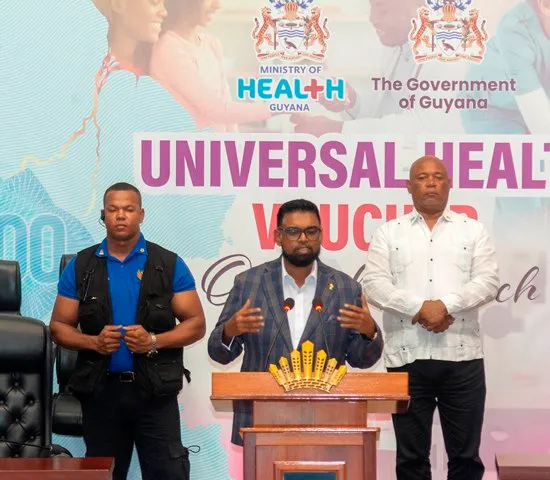The race for Guyana’s next government has officially begun. On May 26th, during the country’s 59th Independence Day celebrations, President Dr. Irfaan Ali formally announced that general and regional elections will be held on September 1, 2025—exactly five years since Parliament was last convened. The declaration sets the tone for what could become one of Guyana’s most consequential elections in decades.
Amidst rising global attention on Guyana’s oil-fueled transformation, the vote will not only test electoral readiness but also the direction of a young nation standing at a unique economic and political crossroads.
A Pledge Kept: Timely Elections in Sharp Contrast to 2020
In 2020, Guyana’s election process was marred by delays and post-vote controversies that triggered international scrutiny. In contrast, President Ali’s early announcement signals a commitment to constitutional order, transparency, and institutional credibility.
“This election is about protecting democracy, not just contesting power,” said Vice President Bharrat Jagdeo, referencing the five-year cycle that many say was violated under the previous APNU+AFC administration, when elections were delayed by over a year following a no-confidence motion.
The Guyana Elections Commission (GECOM) has confirmed that preparations are on track. Voter registration drives, electoral education campaigns, and monitoring mechanisms—including both local and international observers—are in motion. GECOM Chair Justice (Ret’d) Claudette Singh has ruled out rushed changes to biometric systems, affirming that the elections will proceed under the current legal and operational framework.
PPP/C Enters Campaign Trail on Record of Delivery
The incumbent People’s Progressive Party/Civic (PPP/C) enters the electoral season with confidence built on a backdrop of record economic growth, social investments, and geopolitical clout. Since taking office in August 2020, the administration has overseen:
-
The largest national budget in Guyana’s history (G$1.38 trillion / US$6.63 billion in 2025).
-
Tripling of capital spending, funneled into highways, health, education, housing, and energy.
-
Tuition-free university education, fulfilling a decades-old national aspiration.
-
Direct cash transfers and pension increases for vulnerable families and seniors.
-
Massive housing allocations and rural infrastructure upgrades in all ten regions.
The International Monetary Fund recently praised Guyana’s fiscal stewardship, noting that despite the oil boom, the government has managed to balance growth with macroeconomic stability, avoiding common pitfalls of resource-rich countries.
“Promises made, promises kept,” President Ali said during his Independence speech in Berbice—a phrase now likely to become central to the PPP/C campaign.
A Fractured Opposition Scrambles for Unity
Across the aisle, the opposition—anchored by the People’s National Congress Reform (PNCR) and the Alliance For Change (AFC)—is still grappling with internal divisions. Despite efforts, the two parties have yet to agree on a unified slate, leaving voters unclear about their leadership, policies, or presidential candidate just months before Nomination Day.
The opposition’s primary talking points center on:
-
Calls for a new voter list and stricter verification protocols.
-
Allegations of unequal distribution of oil wealth.
-
Concerns over transparency in public contracts.
However, these arguments may face headwinds. Independent observers judged the 2020 vote credible, and GECOM’s safeguards—biometric ID, fingerprint verification, photo lists—remain intact. Meanwhile, the opposition’s organizational struggles were laid bare in the 2023 Local Government Elections, where the PPP/C won more than 290 constituencies uncontested due to a lack of opposition candidates.
Emerging Defections and A New Political Mood
In an unprecedented development, several opposition officials from Region 4—Guyana’s most populous and traditionally APNU-aligned region—have broken ranks to endorse President Ali. Their reasons? Delivery. Inclusion. Vision.
“The PPP/C has demonstrated it is governing for everyone, not just its base,” said Region 4 Vice Chair Samuel Sandy, a long-time APNU figure, who has now publicly backed the President.
This crossover underscores what some see as a quiet realignment in Guyanese politics, particularly among younger leaders and voters who are tired of ethnic divisions and demand results over rhetoric.
Election Stakes: Prosperity, Participation, and Public Trust
What’s clear is that this election is more than a routine democratic exercise—it is a referendum on how Guyana will manage its unprecedented economic transformation.
The PPP/C is positioning itself as a party of progress and inclusivity, citing delivery across all ten regions and all ethnic groups. With oil revenues projected at US$2.5 billion in 2025, the party argues that only experienced, responsible governance can ensure sustainable development.
The opposition, on the other hand, is urging voters to hold the government accountable, spotlighting the need for strong checks and balances in a rapidly centralizing state.
The Road to September: What to Watch
-
Nomination Day in July will clarify who’s on the ballot—and who isn’t.
-
Voter education and turnout will be critical. In 2020, voter enthusiasm was high; this year, some analysts expect greater scrutiny, especially among first-time voters.
-
International observers, including the Commonwealth, EU, OAS, and CARICOM, are expected to play a monitoring role.
“Free, fair, and timely elections are not just a democratic duty—they’re a signal to the world that Guyana is ready for the next stage,” said one Western diplomat based in Georgetown.
Final Word: A Nation on the Brink of Transformation
For the average Guyanese, this election is about more than political parties. It’s about whether the benefits of the oil boom will reach their doorstep, whether governance will remain inclusive and fair, and whether Guyana will continue its upward trajectory or risk losing hard-won gains.
As President Ali put it:
“This isn’t just about PPP or PNC—it’s about who can build a better Guyana for every citizen, in every community.”
Come September 1st, the people will decide.
Sources: Guyana Chronicle, Guyana Times, Trinidad Guardian (CMC), GECOM statements, IMF briefings




